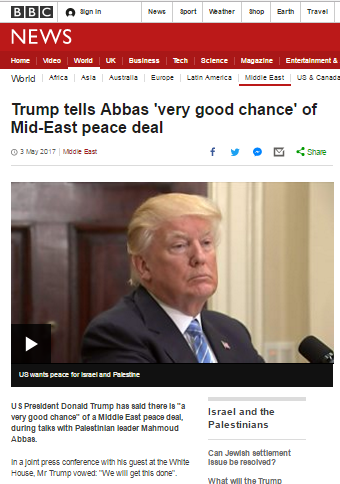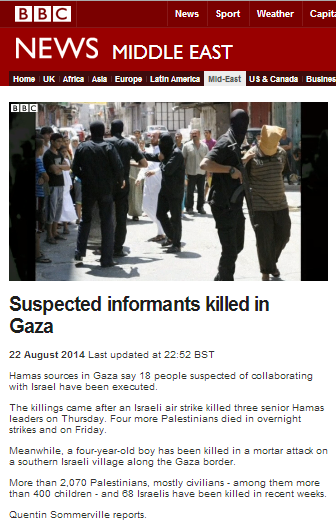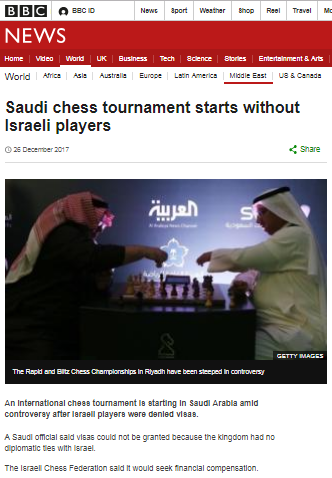When the Israeli prime minister visited the White House in February of this year no fewer than eight reports relating to that topic appeared on the BBC News website’s Middle East page.
When the Palestinian Authority president Mahmoud Abbas visited the White House on May 3rd, just one article appeared on the BBC News website under the headline “Trump tells Abbas ‘very good chance’ of Mid-East peace deal“.
That report includes the following:
“On Wednesday, the US president stressed there would be no lasting peace unless both nations found a way to stop incitement of violence.”
The official transcript however shows that – in contrast to the BBC’s claim – the American president’s remarks did not refer to “both nations”:
“But there cannot be lasting peace unless the Palestinian leaders speak in a unified voice against incitement to violate – and violence and hate. There’s such hatred. But hopefully there won’t be such hatred for very long. All children of God must be taught to value and respect human life, and condemn all of those who target the innocent.”
That inaccurate reporting is of course particularly glaring in light of the fact that the BBC repeatedly downplays and/or ignores the issue of Palestinian incitement and glorification of terrorism.
However, a bright spot in this report is that it does include coverage of an issue that the BBC has serially avoided reporting over the years.
“The Palestinian leader is under pressure to halt payments to families of Palestinian prisoners and those killed in the conflict with Israel.
Israel’s government says the payments encourage terrorism, but Palestinian officials say stopping them would be politically untenable for Mr Abbas, who is deeply unpopular back home. […]
Three influential Republican senators, meanwhile, called on Mr Trump to tell Mr Abbas to stop using aid money to pay the families of Palestinian “martyrs” and those imprisoned in Israel for offences ranging from stone-throwing to murder.
“Morally it must end because the United States cannot be complicit in incentivising terror,” Marco Rubio, Tom Cotton and Lindsey Graham wrote in a joint letter.
“And strategically it must end because the PA will never convince Americans, the Congress, or Israel that it is serious about peace while it is still funding terror.”
The PA spends about $300m (£232m) each year – about 8% of its budget – on salaries and benefits under the programme, according to the senators.
The chairman of the Palestinian Prisoners’ Affairs Committee has defended the payments, saying they represent a “national, humanitarian and social duty that shall always be fulfilled regardless of Israeli and international pressures”.
An adviser to Mr Abbas also told the Associated Press that the president could not afford to concede, especially with one of his main rivals leading a widely supported hunger strike by hundreds of Palestinian prisoners in protest at conditions in Israeli jails and the detention of people without trial.”
Audience understanding of the frequently covered ‘Middle East peace process’ would of course be well served by further reporting on this issue.
In contrast to other media reports on the Trump-Abbas meeting, this article fails to inform BBC audiences of Mahmoud Abbas’ egregious claim that “we are raising our youth, our children, our grandchildren on a culture of peace”.
The article also includes the insert titled “What is the two-state solution?” that has appeared in a number of BBC News website articles published since late December 2016.

As we see, despite the fact that it inaccurately suggests to audiences that there is one uniform Palestinian leadership and notwithstanding the fact that just two days prior to Abbas’ visit to Washington, Hamas once again clarified that it does not embrace the two-state solution, that problematic and misleading insert continues to be used.
Related Articles:
BBC News website’s explanation of the two-state solution falls short
BBC Complaints: inaccurate portrayal of Palestinian leadership is not a ‘significant issue’




